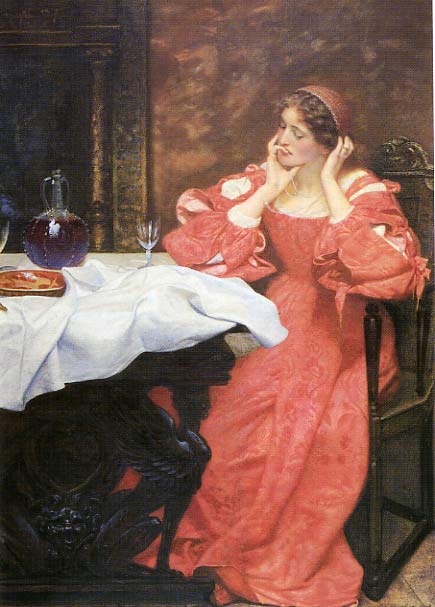 |
| Death of Roland at the Battle of Roncevaux. |
During the middle ages, Christians assigned the name Termagant to a deity or idol that they believed Muslims worshiped. The claim has no basis in fact but the belief that Muslims worshiped Termagant became widespread throughout Christian Europe. Middle English speakers rendered the name as Tervagant while in Old French it was Tervagan and in Italian Trivigante. In the epic French poem La Chanson de Roland (The Song of Roland) from the late 11th century, the Muslims desecrate their idol Termagant after losing the battle of Roncevaux.
E Tervagan tolent sun escarbuncle, / E Mahumet enz en un fosset butent,Another example appears in Syr Guy of Warwick--a Middle English romance--in which a Sultan says:
They strip the fire-red gem off Termagant / And throw Mohammed down into a ditch. (lines lines 2589–90)
So help me, Mahoune, of might,Geoffrey Chaucer uses the term in the Tale of Sir Thopas--a parody of chivalric romances--from The Canterbury Tales.
And Termagant, my god so bright.
Til that ther cam a greet geaunt,The origin of the word is uncertain. One theory argues that the original term was Trivagante, meaning "thrice wandering," a reference to the moon known by the three names: Selene, Artemis, and Persephone. The use of the crescent moon in Islamic imagery may have suggested the relationship to Islam. A second theory posits an Old English source, tying the word to the Germanic god Tiw and the phrase tiw migtig r, meaning "very mighty." A third theory suggests that the word came from tyr-magian, meaning "Magian god" when Europeans confused Muslims with Zoroastrian Magi.
His name was Sir Olifaunt,
A perilous man of dede;
He seyde "Child, by Termagaunt,
But if thou prike out of myn haunt,
Anon I sle thy steede
With mace.
Heere is the queene of Fayerye,
With harpe and pipe and symphonye,
Dwellynge in this place." (lines 117-26)
Termagant became a familiar figure in medieval morality plays. Often clothed in a turban and long, flowing Eastern style robes, he was a ranting, violent, and overbearing villain who threatened his servants and worshipers. Shakespeare mentions the stock figure in Act III, scene 2 of Hamlet when Hamlet cautions some actors to not rant and rave.
 |
| The Shrew Katherina |
| by Edward Robert Hughes (1898). |
I could have such a Fellow whipt for o'erdoing Termagant: it out-Herod's Herod.Through popular usage, the term became an adjective for a violent, overbearing person or bully. Because the character Termagant from the plays dressed in long gowns similar to those worn by European women, the adjective termagant became associated with women instead of men, so that today, a termagant is an overbearing or nagging woman, a shrew.
No comments:
Post a Comment